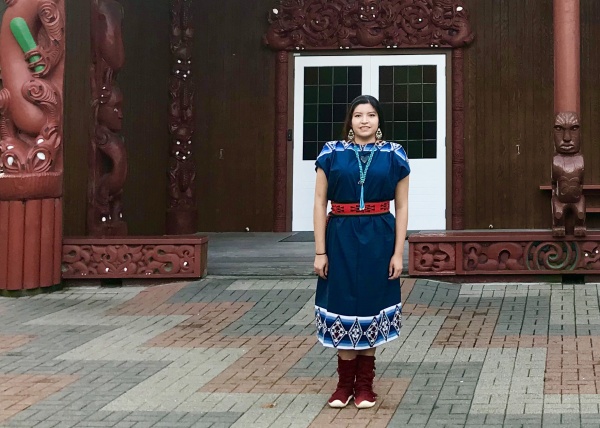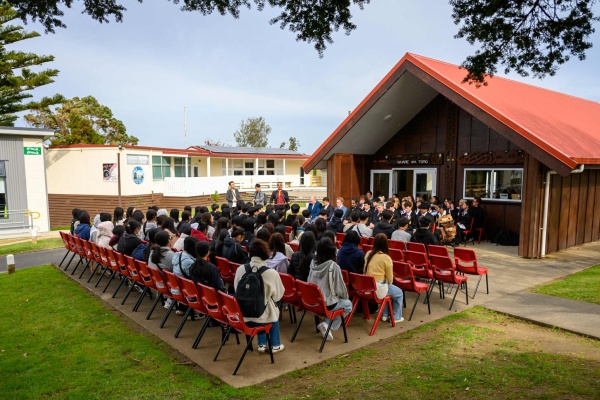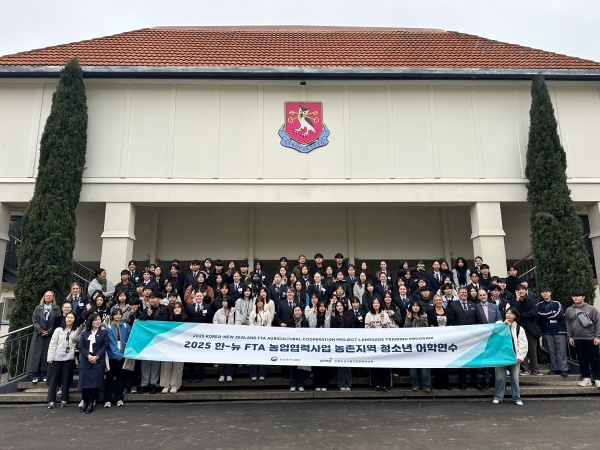Search
Showing 10 of 1702 results for the cuzzy rolly, latest
-
Government announces International Education Going for Growth Plan
The Plan outlines an objective to double the international education sector’s economic contribution by 2034. This target has been set at $7.2 billion.
In the short term, the Plan will have Education New Zealand (ENZ) focus its promotional efforts on markets with the highest potential for growth while continuing to maintain New Zealand’s strong presence and reputation for high-quality education in other markets.
ENZ Chief Executive Amanda Malu says New Zealand reaps a broad range of economic, social and cultural benefits from having international students in our classrooms and communities.
“A New Zealand education experience transforms lives, creating lifelong connections between students and Aotearoa. International education fuels innovation, boosts our economy, creates business opportunities, and delivers essential cross-cultural skills for a more connected world. The International Education Going for Growth Plan brings to life a vision to grow New Zealand as the destination of choice for international students,” Ms Malu said.
The plan to grow the international student sector has three objectives:
1. raise awareness of New Zealand as a study destination from 40% in 2024, to 42% in 2027 and 44% by 2034.
2. grow student enrolments from 83,400 in 2024 to 105,000 in 2027 and 119,000 by 2034.
3. increase the proportion of prospective students rating NZ among their top three choices of study destination from 18% in 2024 to 20% in 2027 and 22% in 2034.
In November 2025, in-study work rights will increase from 20 to 25 hours per week for eligible student visa holders and in-study work rights will be extended to all tertiary students in approved exchange or Study Abroad programmes, including programmes one-semester long.
The Ministry of Business, Innovation and Employment (MBIE) will progress work on medium-term immigration actions under the Plan - design of a new short duration visa for some sub-degree qualifications not eligible for post-study work rights and ways to make it easier for students to apply for multi-year visas. MBIE will seek input and views from key stakeholders to inform the development of this work.
You can view the International Education Going for Growth Plan document here.
-
Māori cultural experience builds lasting bonds for international students
Alongside courses in Māori culture, customs and language, some educational providers in New Zealand have offered an immersive noho marae (marae stay) experience. For students a long way from home, the warmth of the welcome and the sharing of knowledge, traditions, and food, gives them a lasting sense of belonging to Aotearoa.
One of the first educators to recognise the importance of sharing Māori culture with international students is Taituwha King, Senior Lecturer in Māori and Indigenous Development at Auckland University of Technology (AUT). For almost 20 years he has been running noho marae at the beginning of each semester to give international students a comprehensive cultural introduction to their study experience.
Such was the success of noho marae that King developed a course around it, called International Noho Marae – Indigenous Encounters of a Māori Kind, in 2010. It covers basic Te Reo Māori, Māori history, waiata (songs), and cultural customs, and is capped off with a weekend marae stay. It quickly became the second most popular class for international students at AUT, after another of King’s classes – Te Ara Pou Leadership. More than 1500 students have enrolled in the courses since 2002.
“The courses put indigenous goggles on students and open them up to areas of discussion with their own indigenous people,” King says.
Immersing in Māori culture is life changing
This is certainly true for Native American student Hailey Suina, from the Pueblo of Cochiti and Navajo Nation. She travelled to New Zealand on the Education New Zealand Go Overseas scholarship, already curious to explore the cultural connections between the Māori people and the indigenous people of North America.

She describes the time she spent immersed in Māori culture as “life-changing,” and returned home determined to use her experiences to become a leader in her community.
Hailey says she was amazed by the similarities between the Cochiti Pueblo and Māori peoples, which include a collectivist rather than an individualistic culture, a sense of guardianship for nature, and strong ties with ancestors.
“From the moment I arrived, I felt a deep connection with the Māori culture. It was like stepping from one home to another.”
So strong was the concept of whānau and whakawhanaungatanga (kinship connections) for a number of King’s students, that they developed Whānau Councils as a way of staying connected and building on the bonds of their shared New Zealand experience once they returned home. With the first one established in 2010, there are now three - two in the US and one in Europe.
Pre-Covid, students in Europe would meet up annually. King and other AUT staff committed to joining them, cementing the enduring relationship and ongoing commitment of AUT to its alumni.
“Events like noho marae and the Whānau Council meet-ups also provide an opportunity for prospective international students to learn about and consider AUT as a destination to study abroad and build relationships with key employers linked to our alumni,” says King.
Europe council co-founder Anne Heimbeig says being part of the Whānau Council is “a very emotional thing”.
“I’ve met great people from different countries. Together, we’ve overcome lots of stereotypes and wrong assumptions, and brought Māori culture out into the world.”
There was a sense of home, belonging, warmth, and love on the marae, says East Coast USA council co-founder Jessica Cohen.
“Being in the Whānau Council allows us to keep that spirit alive and remember the value of our whānau even when we are far away from our beloved Aotearoa.”
-
Upcoming webinar: New Zealand International Education Enrolments 2024
Webinar details
- Wednesday 30th July, 11:00am-12:00pm (UTC+12)
- Register here: New Zealand International Education Enrolments 2024
Following the recent launch of the International Education Going for Growth Plan, join this webinar with Marie Clark, Director Insights, Education New Zealand Manapou ki te Ao, to hear more about the 2024 international student enrolments.
The full-year 2024 international student enrolments saw New Zealand reach 72 percent of pre-pandemic levels seen in 2019, with most sub-sectors contributing to this growth. Primary and intermediate schools have experienced the strongest growth, and New Zealand universities and government-funded PTEs are now very close to meeting or exceeding their 2019 enrolment numbers.
During this session, Marie will take participants through the data, including total enrolment numbers by subsector, highlight emerging trends and will offer advice on how this information can be used in your organisational planning.
If you have something you would like us to specifically highlight or a question please email insights@enz.govt.nz by 5pm Monday 28 July.
-
Student visas moving to enhanced Immigration Online
From 18 August 2025, all international student visa applications will move to Immigration New Zealand’s enhanced Immigration Online system. For education agents submitting applications on behalf of international students around this timeframe, here are important updates on how applications will be managed during this transition –
-
All applications submitted on or before 17 August will be processed under the old system
-
Draft applications that have not been submitted by 17 August have until 17 September to be completed and submitted.
-
International students should still aim to apply 3 months ahead of their intended travel date regardless of the change in Immigration New Zealand’s application forms. This will help to avoid delays that may impact students’ ability to begin study.
To help you prepare, Immigration New Zealand has developed this video explaining the new process: Guidance on the new Student Visa application form.
If you have questions, please submit using this form: https://forms.office.com/r/DkHAk36fiw by 1 August, Friday 6pm NZDT.
Responses will be uploaded onto https://agentlab.enz.govt.nz/inz-faq-topics/ on 18 August.
Important to note: Immigration New Zealand will do its best to answer submitted questions but may not be able to respond to all of them. Questions that will be resolved by viewing/using the new Student Visa application form on 18 August will not be answered.
-
-
From the CE: From planning to implementation on growing international education
Kia ora koutou,
It was wonderful to see the International Education Going for Growth Plan announcement in July coincide with positive student stories from regions such as Canterbury and the Waikato. These featured the rise in international student numbers across subsectors, and local councils celebrating international student achievements and community contributions.
This month we have turned our minds to implementation, with the launch of our Go-To-Market Plans. These plans focus on nine markets with the highest potential for growth: China, India, the United States of America, Sri Lanka, Viet Nam, the Philippines, South Korea, Japan, and Thailand.
The next step for ENZ is to develop ‘lighter touch,’ tailored plans for markets where we will maintain New Zealand’s strong presence and reputation for high-quality education: Germany, Brazil, Indonesia, Malaysia, the Gulf Cooperation Council countries, Chile and Colombia.
An incredible amount of cross-sector engagement has gone into progressing this work. I am grateful to education providers for the open and meaningful way you have responded over the past few weeks.
On 11 August, ENZ launched a new brand campaign – New Zealand Taught Me – that highlights stories of alumni of New Zealand, aiming to connect emotionally with the values and aspirations of globally-minded prospective international students.
Delivered at pace, this campaign is designed to reignite and heighten interest in New Zealand as a study destination, ahead of the full launch of a New Zealand global brand platform later in the year. If you have not seen the campaign hero video, you can view and reshare it off this link.
Next month, I will be attending the 35th European Association for International Education (EAIE) Conference in Gothenburg, Sweden, followed by the ICEF Monitor Global Summit in London, UK, where I will be sharing insights on students’ preferences for study in New Zealand and our plan to build international student enrolments over the next 10 years.
Ko te pae tawhiti whāia kia tata, ko te pae tata whakamaua kia tina
Seek to bring distant horizons closer, and sustain and cherish those that you attain
Ngā mihi nui,
Amanda Malu
Chief Executive
-
Update from Immigration New Zealand
Student Visa Update: Apply early with our new online forms
Planning to study in New Zealand in 2026?
Immigration New Zealand’s peak visa processing period runs from October to March, so it’s important to apply early to avoid delays - ideally at least three months before you travel.
On 18 August, applications for the following student visa types transitioned to Immigration New Zealand’s enhanced Immigration Online system:
- English Language
- Exchange Student
- Fee Paying Student
- Pathway Student
- NZ Government Scholarship Student
- Foreign Government Supported Student
Applications submitted on the old form on or before 17 August will still be processed. Applicants can continue to upload documents and respond to requests until a decision is made. Draft applications on the old system must be submitted on or before 17 September, after that all applications must be submitted through enhanced Immigration Online. Paper applications will no longer be accepted from 18 September.
We’ve redesigned the application process to make applying faster, easier, and more transparent. Applicants will get real-time updates, email notifications, and clearer guidance throughout the process. The form itself is dynamic, only showing sections and asking questions relevant to their situation. It also includes guidance and prompts to support you through the process.
For help with the online form, visit our Applying Online help page, or contact Immigration New Zealand.
-
Around the world in five
China
A new visa scheme announced by China this month to woo international STEM talent to the country could encourage more short-term exchanges, visiting fellowships, and cooperative research projects, according to experts.
Global
ICEF Monitor explored how proposed changes to post-study work policies in the US and UK could reshape international student mobility.
United States of America
A National Foundation for American Policy report warns that many US colleges could shut down without international students and immigrants.
Australia
Australia’s international education sector has endured 18 months of turmoil. Sudden policy shifts, political rhetoric blaming both students and agents, and a looming cap on international student numbers have shaken confidence in what was once a beacon for global learners.
Pakistan
Pakistan's large youth population is fuelling a surge in student mobility, with the UK, US and Germany seeing the largest growth, a new report has revealed.
-
Viet Nam webinar series boosts interest in New Zealand ITPs and PTEs
The webinar series is part of a work programme to raise the profile of New Zealand’s subsectors in Viet Nam, while strengthening connections between New Zealand providers and Vietnamese education agents.
This initiative is key to ENZ’s ongoing efforts to diversify New Zealand’s international education offerings in Viet Nam, and ensuring prospective students are aware of the practical skills, industry connections, and post-study opportunities they can gain through New Zealand ITPs and PTEs.
The series featured three education agent-focused webinars, and one session for prospective students and their parents co-organised by ENZ and seven local education agencies.
The agent-focused webinars attracted an average of over 120 attendees per session, peaking at 131, demonstrating strong interest from Viet Nam’s agent network.
The student-facing webinar drew around 200 registrations and had 70 prospective students attend.
Participating New Zealand providers included Wintec, Nelson Marlborough Institute of Technology, Ara Institute of Canterbury, Eastern Institute of Technology, Toi Ohomai, Southern Institute of Technology, WelTec & Whitireia, New Zealand Skills and Education Group, Pacific International Hotel Management School, Le Cordon Bleu, and Up Education (NZTC, NZMA, Yoobee).
This wide sector presence ensured agents and prospective students received timely sector updates and insights first hand.
Immigration New Zealand contributed to the first agent-only session with updated details on in-study and post-study work rights for international students in vocational and degree programmes at ITPs and PTEs. They also shared policy updates, guidance, best practice on pathway visas, and practical tips to help agents prepare and submit strong visa applications for ITP/PTE students.
ENZ Market Manager Van Banh said the feedback was positive.
“New Zealand providers said they really valued the opportunity to connect with the Vietnamese market through these webinars, noting that the format allowed them to share tailored information and highlight the strengths of their programmes,” she said.
“Vietnamese agents also gave positive feedback, and said the sessions equipped them with practical knowledge about New Zealand’s study options with ITPs and PTEs, so they can be even more confident and effective in their conversations with prospective students,” Van added.
-
Meet Takako Tominaga – ENZ’s new Senior Market Manager for Japan
Based in Tokyo, Taki’s role focuses on strengthening New Zealand’s education brand in Japan and increasing student interest in studying in Aotearoa. Her career spans over a decade, including roles with the Victoria State Government, Airbnb during the Tokyo Olympics, and several education institutions in Melbourne.
Taki’s connection to New Zealand runs deep – her first overseas experience was studying in Hamilton and Rotorua. That formative time in New Zealand sparked a lifelong passion for international education.
“The wonderful experiences I had in New Zealand were the starting point of my journey. I’m excited to help others discover the beauty and strengths of studying there,” she said.
Taki has hit the ground running in her role and has already supported a visiting delegation from English New Zealand and represented ENZ at a variety of events.
Contact Taki via Takako.Tominaga@enz.govt.nz if you would like to learn more about the Japan market.
-
Language and culture exchange strengthens ties with South Korea
The students, from 64 schools across South Korea, were welcomed by Waiuku College and St Peter’s School in Cambridge, where they connected with local students, explored school facilities, and experienced Kiwi culture first-hand. From powhiri to classroom visits, the exchange sparked meaningful cross-cultural connections.

Powhiri at Waiuku College.
Waiuku College Director of Community and Global Relations, Antionette Walters, said the students were amazing, and willing to make the most of their experience.
“They were so happy to give anything a go – they even loved trying a New Zealand mince pie!” she said.
At St Peter’s, students toured the Equestrian Centre and Golf Academy, with Head of School Jason Speedy welcoming the group and sharing insights into the school’s campus and learning environment.
The visit followed a two-week English training programme in rural South Korea, where six experienced New Zealand teachers taught students aged Year 8–11. Selected from over 35 applicants, the teachers represented schools from Hamilton, Hawke’s Bay, Auckland, Cambridge, Wellington, and Tauranga.
ENZ representatives joined the programme’s opening event in Yangpyeong on 25 July, meeting the teachers and witnessing the enthusiasm of Korean students engaging with New Zealand’s distinctive teaching style.
Bernadette Moffat, ESOL Teacher at Silverdale Normal School and Huntly Primary School, said: “It was a privilege to represent New Zealand and see how eager the students were to learn.”
Bernadette was one of six New Zealand teachers who travelled to Korea to teach English and attended the closing ceremony where students were recognised for excellence in English.
Looking ahead, EPIS is exploring the possibility of expanding the current short visit into a four-week study experience in New Zealand from 2026, offering even deeper immersion for future scholarship recipients.

